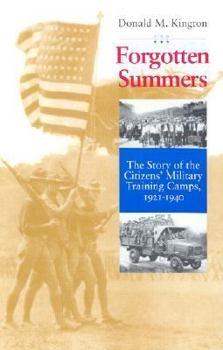Forgotten Summers: The Story of the Citizens' Military Training Camps 1921-1940
From 1921 to 1940, young men from all over the nation zealously joined in month-long summer camps run by the U.S. Army. Many drew on soldiering skills learned at Citizens'Military Training Camps in... This description may be from another edition of this product.
Format:Paperback
Language:English
ISBN:0964578905
ISBN13:9780964578906
Release Date:January 1995
Publisher:Two Decades Publishing
Length:256 Pages
Weight:0.88 lbs.
Dimensions:0.8" x 5.5" x 8.5"
Customer Reviews
3 ratings
Informative entertainment for any student of America's past.
Published by Thriftbooks.com User , 26 years ago
First of all, this book made me nostalgic for a time before (way before) I was born. It contains fascinating insights into the psyche of the American public, viewed through the lens of the CMTC. This book sheds light on what Americans of all types were actually feeling during the years leading up to World War II. A great history book allows its readers to experience vicariously what life was really like-alongside, and in relation to the subject matter. The author has done a marvelous job in doing so here. Highly recommended.
Between-the-wars military history
Published by Thriftbooks.com User , 26 years ago
Anyone interested in American military history should have this book. It covers the gap between World Wars I and II and important aspects of the early careers of Marshall and MacArthur. Reagan and Truman both attended the summer military training explained here. Robert Penn Warren wrote his first poem while in CMTC training at Fort Knox. Great blending of military and social history of the 1920s and 1930s.
Entertaining account of a little known military program.
Published by Thriftbooks.com User , 26 years ago
Between the two World Wars (1921 to 1940), thousands of American males trained at some 50 camps located all over the U.S.and in Puerto Rico. The CMTC program (not to be confused with CCC and other programs of the Depression) was the brainchild of Gen. John "Black Jack" Pershing and benefited from the management skills of Douglas MacArthur and George C. Marshall. Two future presidents, Truman and Reagan, participated, and Robert Penn Warren published one of his first poems in the CMTC yearbook at Fort Knox. Two things make this book especially interesting reading. First, it is based in part on questionnaires from CMTC alumni, many of whom used their summertime soldier skills in World War II. Second, the author, a retired Army colonel with a felicitous style, is keenly interested in the social history of the time and leavens his account of life in the camps with anecdotes from the sports, political, and cultural worlds of the era, which provides a view of the simpler America that the trainees lived in. In short, this is military history combined gracefully with Americana. It is, I believe, the only account of a program that should not be forgotten.






